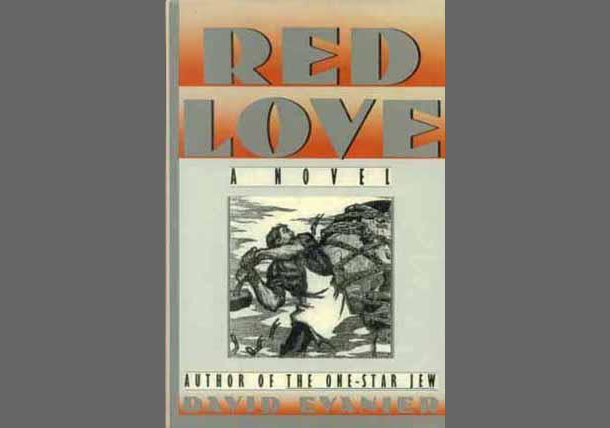[This review first appeared in the June 1991 issue of Chronicles.]
Red Love is “third generation Leninist” porno star Suzie Sizzle’s yet-unmade dream project, the love story of her aunt and uncle, the Rosenberg-like spies Dolly and Solly Rubell. Until Suzie’s industry develops a revolutionary consciousness, we’ll have to settle for David Evanier’s novel of wit, fine malice, and the same title.
But first, a cavil: do we really need another book about this vile brace of traitors? The Communist Party never amounted to more than a band of jabbering foreigners and slumming heiresses in a couple of big East Coast cities. At its peak in 1932, the CP presidential candidate won 103,000 votes—about one-ninth the tally of Socialist Norman Thomas. Plenty of American radicals (Huey Long, Arthur Townley, Bob La Follette, Father Coughlin, Francis Townsend) attracted large followings in the prewar years but, with the happy exception of Huey, novelists and historians have slighted them. Even Eugene V. Debs, our greatest Marxist, a patriot whose socialism was seeded in his “beloved little community of Terre Haute, where all were neighbors and friends,” is dwarfed by the contemptible Rosenbergs in American myth-history.
Okay, that’s off my chest. Now on to the novel.
Red Love is narrated by Gerald Lerner, an apostate Communist out to bury once and for all the Rubells and the god that failed. Lerner came to the party in the late 50’s, after Khrushchev’s indictment of Stalin had denuded the CP of all but the most wretched losers. The remaining comrades “didn’t f—, work, or change their socks—ever. They were eaters, shouters, screamers, slurpers. Healthy revolutionary males in their thirties had to be F.B.I, men.”
And yet, the legend goes, there was a sunny Depression morn when progressive youth dreamed “a dream of justice,” as Leonard Michaels says in his wildly inappropriate blurb for Red Love. (Did he read the book?) Communism would stamp out religious faith and parochialism and family love and other impediments along the road to Utopia. The spoilsport Emma Goldman was warning that Bolshevism meant only “a change of masters,” but, well, a cold heart like Emma’s could never feel what Vivian Gornick termed “the romance of American communism.” In the halcyon 30’s, comrades were young and gay and life was an endless summer day.
Lerner learns that even in its golden age, communism had all the romance of a rape. The stateside Communists whom he encounters in his investigation of the Rubell case are Jews who scorn Judaism: on holidays they roast pigs and sing Christmas carols and watch blue movies and mock “the yarmulkes”—the schleps who cling to the old ways. Accounts of Stalin’s pogroms are dismissed as fascist propaganda; disillusioned returnees from the Lincoln Brigades are deemed shellshocked counterrevolutionaries.
Evanier, I think, sensed that the Rubells’ tale verges on the stale; Red Love‘s virtue is its gallery full of portraits of other wasted lives. Young Pioneers in New York City chant “Down with the Boy Scouts” and watch a boxing match in which Science knocks out Religion and the referee; an old crone keeps a bust of Stalin on her bookshelf and addresses her disturbed son as “fellow worker”; Paul Robeson records play, and play, and play.
Evanier writes frequently for Commentary, but Red Love is no repentant rant by a guilt-ridden ex-lunchroom Trotskyite. Some passages are actually funny:
—A comrade recalls Solly’s attitude toward his Roy Cohn-like nemesis, Hy Briske: “If Solly had his way, he might have exterminated this scumbag, but only if he was told to do so. His first approach would have been to attempt to correct Hy’s thinking.”
—Solly gushes over the Little Woman: “Dolly . . . is the most beautiful person I have ever met. . . . She is in pain so much of the time from her back, her headaches, and the suffering of the workers. She has such revolutionary anger; she never deviates from it. She referred to Eisenhower the other day as a “guttersnipe in striped pants.” And “a privileged fascist dog.” . . . I mean, she talks that way to me. I have learned so much from her integrity.”
—Solly’s sister laments at a post-execution rally: “To think he didn’t live to experience the joys of television.”
A few of Evanier’s burlesques fall flat: Hy Briske’s audacious disrespecting of Ike, for one, and an extended take on an anti-Semitic Arkansas radio preacher named Reverend Bob. (Arkansas is one of those states out there, where white-hooded lynch mobs rule the roost and gap-toothed Brylcreemed clerics are named Billy or Bob, or, if to the manor born, Billy Bob. So say the TV Movies of the Week, anyway.)
Evanier stumbles when he ventures beyond Jersey City. A brief chapter set in Alabama is downright embarrassing. America’s open wound—slavery and later injustices visited upon black citizens—is quite beyond cartooning. Evanier’s South is limited to Bull Connor and Noble Sidney Poitier Negroes: it’s the celluloid South of Martin Ritt, flat and unconvincing.
When he sticks to the city beat, though, Evanier is gimlet-eyed and unsentimental. Vivian Gornick and the other CP apologists can burnish and whitewash all they want, but David Evanier knows why the Rubells did it—and why thousands of other intelligent human beings pledged allegiance to the ideology of totalitarianism.
Evanier gives us the key in an exchange between Solly and a CP muckamuck, as the hapless spy ponders his imminent execution.
“I love my babies,” Solly sobs to the woman.
The comrade is unmoved.
“Babies are born every minute,” she assures Solly. “And now they will be free.”
[Red Love, by David Evanier (New York: Scribner’s) 340 pp., $19.95]



Leave a Reply